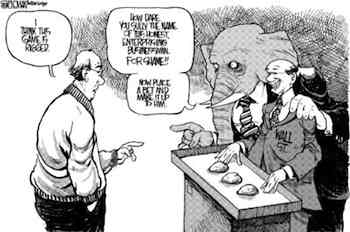- MENU
- HOME
- SEARCH
- WORLD
- MAIN
- AFRICA
- ASIA
- BALKANS
- EUROPE
- LATIN AMERICA
- MIDDLE EAST
- United Kingdom
- United States
- Argentina
- Australia
- Austria
- Benelux
- Brazil
- Canada
- China
- France
- Germany
- Greece
- Hungary
- India
- Indonesia
- Ireland
- Israel
- Italy
- Japan
- Korea
- Mexico
- New Zealand
- Pakistan
- Philippines
- Poland
- Russia
- South Africa
- Spain
- Taiwan
- Turkey
- USA
- BUSINESS
- WEALTH
- STOCKS
- TECH
- HEALTH
- LIFESTYLE
- ENTERTAINMENT
- SPORTS
- RSS
- iHaveNet.com: Politics
by Jules Witcover

The Elephant's Tin Ear
Some wise sage once observed that the only saving thing about repeatedly beating your head against the wall is that it feels good when you stop. It's a lesson the Senate Republicans and their leader, Mitch McConnell, should have learned long ago.
For three straight days recently, the dour Kentuckian had held his filibuster-threatening minority in lockstep, preventing financial industry reform legislation from reaching the
These same Republicans under McConnell had screamed for the
Only when an array of
Senate Majority Leader Harry Reid, quick to grasp the political gift handed him by the Republican stonewalling and the damaging testimony of the
One concession made by Democratic Sen. Christopher Dodd, chairman of the
The question now is how long
As the debate in the
Denying McConnell's early charge that his bill would mean more taxpayer bailouts, he told a crowd in Quincy, Ill., earlier this week "there can be some legitimate differences on certain issues, but the bottom line is consumers have to be protected. We have to end bailouts. We've got to make sure that these trading practices are out in the open. We've got to make sure that people have a say in terms of how these firms operate so they're more accountable....
"What I don't want is a deal made that is written by the financial industry lobbyists. We've had enough of that. I want to listen to what they have to say, but I don't them writing the bill. I don't want Democrats and Republicans agreeing to a bill written by them, for them. I want a bill that's written for you, for the American people."
The Senate Republicans in offering a host of amendments will prolong the debate, and they maintain a sufficient minority to filibuster any legislation. But the longer the debate goes on, the longer they will face public ire, particularly if their efforts are seen in defense of Wall Street bigwigs like those embarrassed by the testimony of the
A principal argument will be over the Obama plan's creation of a consumer protection agency that would require financial institutions to provide buyers of mortgages and other loans with more detailed information on their conditions and obligations. It would also oversee complicated other transactions that have left buyers confused or in the dark in the past.
In all this, the Republicans must weigh the political risk in further drawing out the debate on an issue, unlike health-care reform, in which it will be much more difficult to present themselves as representing the public will. In the end, whatever benefit is accrued from passage likely will go to Obama, and defeat will only reinforce the
Available at Amazon.com:
The Politics of Happiness: What Government Can Learn from the New Research on Well-Being
Bush on the Home Front: Domestic Policy Triumphs and Setbacks
The Political Fix: Changing the Game of American Democracy, from the Grassroots to the White House
AMERICAN POLITICS
WORLD | AFRICA | ASIA | EUROPE | LATIN AMERICA | MIDDLE EAST | UNITED STATES | ECONOMICS | EDUCATION | ENVIRONMENT | FOREIGN POLICY | POLITICS
Receive our political analysis by email by subscribing here
The Elephant's Tin Ear | Politics
© Tribune Media Services